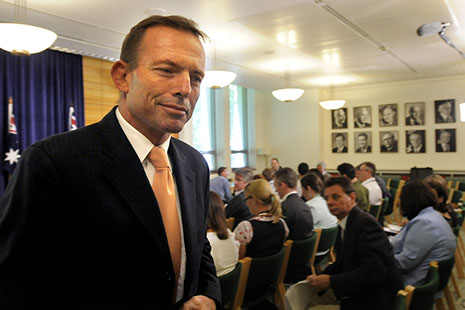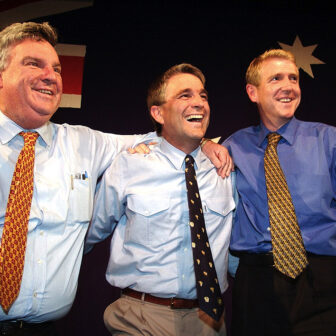THE ELECTION of Tony Abbott as Liberal Party leader marks a dramatic shift in the political landscape – and Kevin Rudd needs to take careful note. John Howard once liked to characterise himself as the most conservative leader the party had ever had, but that claim has now been superseded. Abbott is not only more conservative than Howard, he is far and away the most ideological of Liberal leaders, and quite probably the most ideological yet of any party leader in Australia.
In some aspects this could be seen as a handicap, but the Labor Party has to appreciate that the leadership has passed from the dilettantes and amateurs who have led the party since its 2007 defeat to a seasoned, highly professional, intelligent and creative politician; the game is on in earnest. While there was a certain decorum in the way in which both Brendan Nelson and Malcolm Turnbull led the opposition, Abbott knows no such restraint. Anybody and anything is fair game in what will be a race to the political bottom, and the real question is whether Rudd can make necessary adjustments to his engagement in what is now a very different kind of war and one without rules or scruples of any kind.
The Liberals have taken a real gamble in electing Abbott, a polarising figure in his party in much the same way that he is in the wider electorate. There is no better measure of this than the numbers for his election, the closest margin possible. The most remarkable indication, however, was that the spill vote against Turnbull was carried decisively, 48–34, but clearly seven of those who wanted Turnbull out had an abrupt change of heart when the only alternative was Abbott.
Tony Abbott has always had the capacity to frighten his own horses. In the days when he was an adviser to then Liberal leader John Hewson, he was a one-man dynamo when it came to ideas on policy, strategy and tactics – and he was not afraid to share his ideas. One MP, who later became a senior Howard minister, worried about Abbott, confiding after one conversation: “Thank God he’s not in parliament, and never likely to be. He could wreck us overnight.”
Abbott played a key role in John Howard’s resurrection as leader in the mid-1990s, and Howard had no greater admirer in his team than Abbott. It will have escaped no one’s attention that he has brought into his shadow ministry several of Howard’s people who had been marginalised after 2007. And herein lies a problem for Abbott, who has already signalled his own attachment to the unpopular WorkChoices policy that cost Howard the election.
The Labor Party paid a heavy price for refusing to repudiate the policies and approaches of Paul Keating that aroused so much opposition in his final term as prime minister and led in great part to the brief but spectacular rise of One Nation. A misplaced sense of loyalty on the part of Kim Beazley and Simon Crean prevented them from disowning Keating, and Abbott will bear the same burden in his relationship with Howard.
Abbott’s abiding hero is the late Bob Santamaria, with whom he shares a deep social conservatism as well as a devout Catholicism. But there are aspects of Abbott that would concern Santamaria, foremost among them being his strong identification with and championing of a minimally restrained capitalism. It is often overlooked that before Santamaria embarked on his anti-communist crusade after the end of the Spanish Civil War in 1939 his political bete noir was capitalism, against which he railed for its materialism and its inequalities, not to mention its conflict with Catholic social teaching. Indeed, such a critic of capitalism was Santamaria that he attracted the interest of the CIA, which inexplicably destroyed his file in 1981.
Even in his later years, with communism no longer an issue, Santamaria remained uneasy about the excesses of capitalism, and he was especially scathing of the neoliberal agenda, as supported by Howard and Abbott. It is one of the unexplored ironies of the Catholicisation of the Liberal Party – three Catholic leaders in a row for this once very Protestant party, and a field of three Catholics contesting the last ballot – that it has not been accompanied by that part of Catholic social teaching that seeks to address social and economic inequalities.
Abbott is seeking to mount a defence of laissez-faire capitalism in his refusal to countenance an emissions trading scheme, which he has repeatedly called a big new tax. And in a way it certainly is a regulatory tax on capitalism. But the fact that he has drawn the ire of even that most neoliberal institution, the International Monetary Fund, suggests that there is little support anywhere for such a view.
But there is a deeper, darker side to Abbott’s machinations over carbon trading, and in this regard he has taken a leaf out of the book of another of his heroes, Robert Menzies.
Menzies was dumped ignominiously by his own United Australia Party in 1941, after two years as prime minister. The UAP disintegrated and Labor was triumphant. But in 1944 Menzies did a Humpty Dumpty repair job with all the bits and pieces, and out of it emerged the Liberal Party with “Ming” at its head.
The problem was that at the first election it contested in 1946, it had a leader, a platform and a slate of candidates, but, alas, no real issue. The war had been won, the nation was exhausted, John Curtin had died in office and been succeeded by Ben Chifley; it was a competent government and had already turned its energies to the difficult but popular cause of post-war reconstruction.
In prospect was the realisation of a Labor dream – a planned society, a society no longer at the mercy of boom-bust extremes, depression, mass unemployment and misery. The brave new world, it seemed, was close at hand, and was entirely within the provenance of the Australian Labor Party. The experience of wartime regulation had fuelled hopes that government authority might also be used in peacetime to achieve greater socialisation of the economy; to some, liberal and conservative ideas in Australia were very much under challenge.
The business community viewed these developments with alarm, seeing in Labor’s popular mandate and growing influence the spectre of socialism at the expense of private enterprise. Out of these concerns grew the Liberal Party, formed initially to fight the rising tide of socialism and defend the rights of private enterprise.
But whether Labor’s designs were socialist or merely aimed at achieving a fairer and more just society is debatable; nevertheless, from the time of Labor’s re-election in 1946, socialism and anti-socialism dominated political debate in Australia, fuelled in great part by Chifley’s clumsy attempt to nationalise the private banks in 1947. Labor argued that the measure was designed merely to secure enough control of the economic system as was necessary to maintain full employment, curtail the cycle of boom and bust, and ensure continuous economic expansion in a mixed economy where most industry would be carried out by private enterprise.
It delivered Menzies precisely what he had lacked in 1946 – an issue. And he exploited it for all it was worth, arguing that the legislation (subsequently ruled unconstitutional by the High Court) was a step towards socialism, which now had a negative connotation from the propaganda at the onset of the Cold War. Painting a graphic picture of helpless individuals at the mercy of a giant bureaucracy controlled by a political party, Menzies claimed that this was “the most far-reaching, revolutionary, unwarranted and un-Australian measure introduced in the history of this parliament.”
It was a scare campaign of truly gargantuan proportions – but it gave Menzies what he had so sorely lacked, a rallying point and a slogan. It was, of course, political hyperbole; private enterprise was never in danger, notwithstanding Chifley’s inept move against the banks, but in the heightened political atmosphere of the day rhetorical extremism knew no bounds (the Liberal premier of Victoria even remarking that civilisation itself was at stake). Wholesale nationalisation of industry was never seriously proposed, but suggestions that it was were kept alive and prominent for purely political purposes.
Abbott might well be thinking he can do a Menzies, and scare most of the people some of the time. It is a risky tactic, but also a notoriously difficult approach to counter: once you have the bogeyman, you no longer need an argument. And the Liberal Party has found its bogeyman. •




